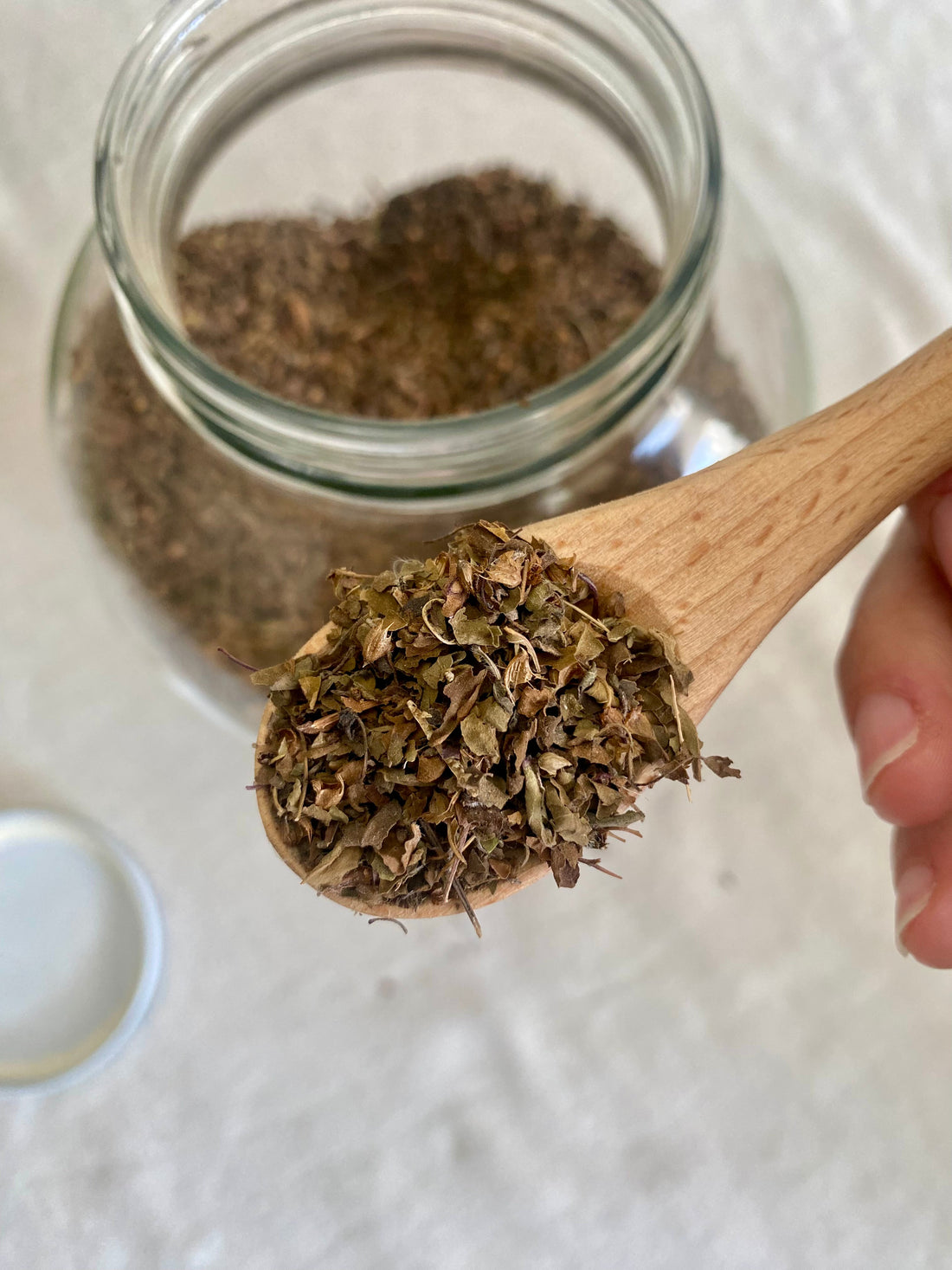Anxiety can affect the body and mind in diverse ways. Recognizing its many manifestations—and understanding how herbs can support you—offers a holistic approach to relief. Here’s a guide to common anxiety symptoms, underlying physiological mechanisms, and the herbs that can help.
Signs Your Anxiety May Be Affecting Your Body
Anxiety is not just a mental state; it often presents as physical symptoms. These may include:
- Nervous gut symptoms: Churning, bloating, diarrhea, constipation, or a “nervous stomach” linked to the gut-brain axis.
- Cardiovascular symptoms: Chest tightness, palpitations, rapid heartbeat, or dizziness.
- Muscle tension: Neck, shoulder, or jaw tightness, restlessness, or tremors.
- Respiratory symptoms: Shortness of breath, shallow breathing, or hyperventilation.
- Neurological and sleep-related symptoms: Headaches, difficulty concentrating, racing thoughts, insomnia, or disrupted sleep cycles.
- Emotional symptoms: Feeling overwhelmed, irritable, or having heightened startle responses.
Understanding these signs helps target both the nervous system and specific physical manifestations with herbal support.
Herbs for Nervous Digestion
The gut-brain axis plays a major role in anxiety. Nervous digestion can be relieved by herbs that support both digestive function and calm the nervous system:
- Ginger (Zingiber officinale): Reduces nausea, calms intestinal cramping, and supports overall digestive motility.
- Fennel (Foeniculum vulgare): Relaxes smooth muscles in the GI tract and eases bloating or gas.
- Chamomile (Matricaria chamomilla): A gentle nervine that calms the nervous system while supporting digestion.
-
Lemon balm (Melissa officinalis): Relieves mild digestive upset and promotes relaxation.
A tea combining chamomile and lemon balm with a hint of ginger and fennel addresses both gut discomfort and nervous tension simultaneously. My Weightless Tea blend is a perfect example of this type of supportive tea, as it combines holy basil, lemon balm, and skullcap to calm the nervous system and gently support digestion.
Herbs for Cardiovascular and Chest Symptoms
When anxiety manifests as palpitations, chest tightness, or dizziness, herbs can help stabilize the heart and nervous system:
- Motherwort (Leonurus cardiaca): Supports heart rhythm, calms racing sensations, and reduces anxiety-related cardiovascular tension.
- Hawthorn (Crataegus spp.): Leaves and flowers support cardiac health and gently ease nervous tension.
- Linden (Tilia spp.): While often used for sleep, linden can also reduce mild cardiovascular symptoms linked to anxiety.
These herbs provide both physical relief and a calming effect on the nervous system. Incorporating these herbs into your routine can complement a calming tea like Weightless, especially during moments of acute stress or palpitations.
Herbs for Muscle Tension, Restlessness, and Social Anxiety
Physical manifestations like shakiness, restlessness, and muscle tension can be especially pronounced during social anxiety or performance-related stress:
- Skullcap (Scutellaria lateriflora): Calms the mind, reduces muscular tension, and eases circular thinking associated with anxiety.
- Kava (Piper methysticum): Strong GABAergic herb that relieves acute tension, particularly effective for social or performance anxiety.
- Blue vervain (Verbena hastata): Acts as an antispasmodic to relax muscles and ease PMS or stress-related cramping.
- Oat straw (Avena sativa): A nutritive nervine that gently restores nervous system resilience.
These herbs are particularly useful when anxiety shows up physically, not just mentally. My Weightless Tea blend also combines skullcap and oat straw, making it a convenient way to address both tension and nervous system support in a single cup.
Herbs for Stress Hormone Regulation and Sleep Support
Chronic anxiety often involves dysregulation of the HPA axis and cortisol imbalance. Herbs that help normalize stress hormones can reduce overall nervous system reactivity:
- Holy basil (Ocimum tenuiflorum): Adaptogen that regulates cortisol, supports resilience, and calms the nervous system.
- Ashwagandha (Withania somnifera): Both an adaptogen and nervine, it restores energy, supports the adrenal system, and promotes restful sleep over time.
- Rhodiola (Rhodiola rosea): Improves stress tolerance and reduces fatigue associated with chronic anxiety.
For stress-related insomnia or anxiety that interferes with sleep, my Sweet Slumber Tea blend is especially helpful. It combines ashwagandha, kava, and other calming herbs to support restorative sleep while easing stress-induced tension.
Integrating Herbs Into Daily Life
Herbs can be taken in teas, tinctures, capsules, or as part of a blend designed for specific needs. For example, a calming tea for nervous digestion could combine chamomile, lemon balm, and ginger. For acute social anxiety, kava or skullcap may be incorporated as needed. Adaptogenic nervines like holy basil or ashwagandha work best when taken consistently to support overall stress resilience. Both Weightless and Sweet Slumber teas are crafted with these principles in mind, making them easy and enjoyable ways to integrate herbal support into your daily routine.
Final Thoughts
Anxiety manifests in many ways—physically, mentally, and emotionally. Using herbs strategically allows you to target the nervous system holistically, addressing gut discomfort, cardiovascular tension, muscular tightness, and stress hormone imbalance. By understanding the different ways anxiety can show up, you can create herbal protocols that truly support your unique experience.
Always consult a healthcare provider if you are taking medication, pregnant, nursing, or managing a medical condition before using herbs in therapeutic doses.

